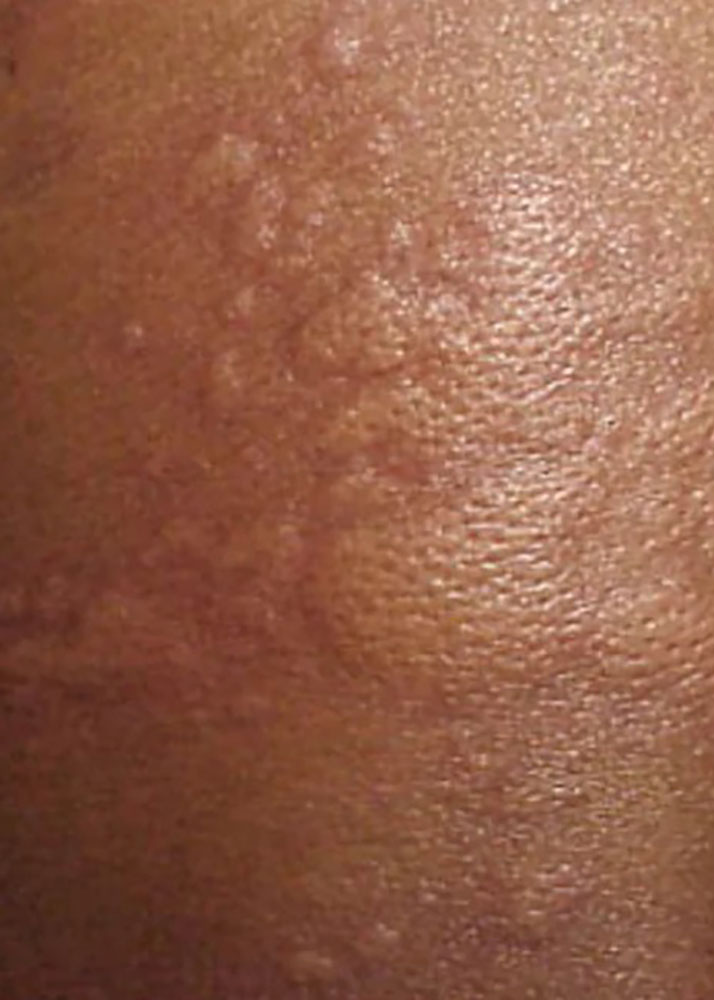Allergy Treatment In Kampala
At Derma Skin Clinic , we provide specialized allergy treatment to help you manage and relieve allergic reactions affecting your skin. Allergies can cause discomfort, redness, irritation, and other skin conditions that impact your daily life. Our expert dermatologists diagnose and treat a wide range of skin allergies, ensuring you receive personalized care tailored to your needs.

What is a Skin Allergy?
A skin allergy occurs when your immune system reacts to a substance (allergen) that it perceives as harmful. This reaction can lead to redness, itching, swelling, rashes, blisters, or peeling skin. Common allergens include certain foods, pollen, dust, chemicals, skincare products, insect bites, and medications.
Common Skin Allergies We Treat
At Derma Skin Clinic, we diagnose and treat various skin allergies, including:
- Eczema (Atopic Dermatitis) – A chronic condition causing dry, itchy, inflamed skin.
- Contact Dermatitis – An allergic reaction triggered by skin contact with irritants like soaps, detergents, or cosmetics.
- Hives (Urticaria) – Red, itchy welts caused by allergens, stress, or temperature changes.
- Psoriasis – An immune-related skin condition leading to scaly, itchy patches.
- Allergic Reactions to Cosmetics & Skincare Products – Irritation caused by specific beauty products.
- Drug Reactions – Skin reactions resulting from medication side effects.
- Insect Bite Allergies – Swelling, redness, and itching caused by insect stings or bites.
Symptoms of Skin Allergies
If you experience any of the following symptoms, you may have a skin allergy:
✔️ Redness and inflammation
✔️ Itching or burning sensation
✔️ Rashes, bumps, or blisters
✔️ Peeling or flaking skin
✔️ Swelling around affected areas
✔️ Dry or cracked skin
If left untreated, skin allergies can worsen over time. Our dermatology experts can identify the root cause and recommend an effective treatment plan.
Our Allergy Treatment Process
1. Consultation & Diagnosis
Our dermatologists will examine your skin, discuss your symptoms, and conduct allergy tests (if necessary) to determine the exact cause of your allergic reaction.
2. Personalized Treatment Plan
Once we identify the allergen, we create a customized treatment plan based on the severity of your allergy. Treatments may include:
✅ Topical Creams & Ointments – Anti-inflammatory creams to relieve itching and redness.
✅ Oral Medications – Antihistamines or corticosteroids to reduce allergic reactions.
✅ Allergy Shots (Immunotherapy) – For severe allergies, we offer immunotherapy to help your body build resistance to allergens over time.
✅ Lifestyle & Skincare Advice – Guidance on avoiding allergens and choosing hypoallergenic skincare products.
3. Long-Term Allergy Management
We provide follow-up care to track your progress and make necessary adjustments to your treatment. Our team also offers preventive strategies to minimize future allergic flare-ups.
Why Choose Derma Skin Clinic for Allergy Treatment?
🌿 Experienced Dermatologists – Our specialists are highly trained in diagnosing and treating skin allergies.
🌿 Advanced Allergy Testing – We use cutting-edge diagnostic tools to pinpoint allergy triggers.
🌿 Personalized Treatment Plans – Every patient receives a customized approach based on their unique allergy needs.
🌿 Safe & Effective Solutions – Our treatments are backed by science and dermatology best practices.
🌿 Support & Guidance – We provide ongoing care and preventive advice to keep your skin healthy.
Book Your Consultation Today
If you’re experiencing itching, redness, or allergic reactions, don’t wait—get expert care at Derma Skin Clinic. We’re here to help you manage and treat your allergies for long-term skin health.
📍 Visit us in Kampala or book an appointment today for professional allergy treatment and relief!

